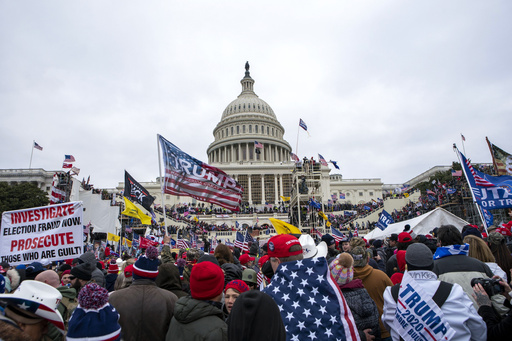
A federal judge, appointed by Donald Trump, has expressed his strong concerns regarding the potential for the president-elect to issue widespread pardons to individuals who participated in the insurrection at the U.S. Capitol following the 2020 presidential election. U.S. District Judge Carl Nichols labeled the prospect of such blanket pardons as “beyond frustrating and disappointing,” marking a notable judicial commentary on a highly politicized issue. This statement was made during a hearing on Tuesday, where he opted to delay the trial for a defendant involved in the Capitol riots until Trump resumes his presidency in January.
Throughout his campaign, Trump characterized the January 6 rioters using terms like “hostages” and “patriots,” asserting that he would “absolutely” consider pardons for those rioters who he believes are innocent. The former president has indicated potential pardons for notable figures, including former Proud Boys leader Enrique Tarrio, who received a 22-year prison sentence for his role in a violent scheme aimed at maintaining Trump’s hold on power after the election.
Judge Nichols, who is involved in overseeing more than 1,500 cases related to the January 6 attack, reflected on the impact of potential pardons during a hearing concerning Jacob Lang, a defendant currently detained as he awaits trial. Nichols remarked on the serious implications of issuing pardons, stating, “Blanket pardons for all January 6 defendants or anything close would be beyond frustrating and disappointing, but that’s not my call.” He emphasized that the possibility of at least some pardons is credible and exists within the legal framework.
Many defendants from the Capitol insurrection have sought to delay their legal proceedings in light of the election outcomes; however, judges have generally rejected these requests, continuing with sentencing and plea hearings. For instance, Steve Baker recently pleaded guilty to charges stemming from the Capitol riot after his request for delay was denied by U.S. District Judge Christopher Cooper, who recognized the remote chance that pardons could alter judicial outcomes.
During the same hearing where Nichols discussed potential pardons, Jacob Lang made a social media post celebrating Trump’s victory. He described himself and other January 6 participants as “political prisoners” who would soon return home, stating, “There will be no bitterness in my heart as I walk out of these doors in 75 days on inauguration day.” Lang faces charges related to multiple assaults on law enforcement officers during the riot.
While Nichols noted that he hasn’t postponed trials solely due to the possibility of pardons, he highlighted specific private discussions that influenced his decision to delay Lang’s case. He expressed acknowledgment of the potential consequences for the judicial process, stressing, “I agree very much with the government that there are costs to not proceeding here.” He pointed out the public’s interest in the timely resolution of legal matters.
Shortly after the election, another judge, Rudolph Contreras, postponed a trial originally set to begin on December 2 for defendant William Pope, who argued that his trial would be futile given the likelihood of a pardon. Contreras mentioned the impracticality of calling numerous jurors for a trial that might not lead to sentencing.
The notion of issuing pardons has raised significant debate among judges. For example, U.S. District Judge Reggie Walton declined to grant a delay for Anna Lichnowski, a woman from Florida advocating for a pardon. Walton stated that the possibility of clemency does not exempt the court from fulfilling its judicial duties, asserting that the legal responsibilities of the Judicial Branch remain a priority regardless of political maneuverings. Such cases reveal the ongoing tensions and complexities surrounding the legal ramifications of the January 6 events and the potential influence of future presidential decisions on justice.
